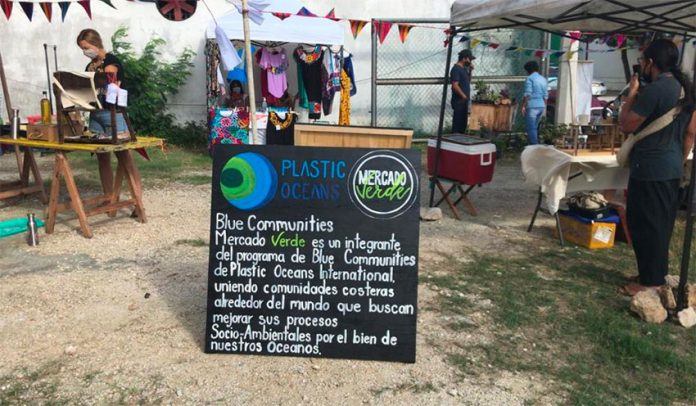In Mexico’s southeast, the little known state of Campeche quietly continues to attract international attention for its progressive, community-driven environmental programs.
Most recently, Plastic Oceans International — one of the most significant international nonprofits fighting single-use plastics and plastic waste — launched a new, groundbreaking BlueCommunities initiative, with Campeche featuring as the first, and currently only, partner in Mexico.
BlueCommunities is a global initiative which brings waterfront communities across the world together to link impactful, local environmental actions, particularly the fight against plastic pollution. The initiative has been developed with the UN sustainable development goals in mind; 17 goals acting as a call to action, at state and local levels, aiming to address global challenges to prosperity and create a more sustainable future for all.
Inaugurally the initiative has been launched in six countries and participating communities: Detroit, U.S.; Alapuzzah, India; Durban, South Africa; Chiloe Island, Chile; Easter Island; and Campeche, Mexico.
“It reminds us we are not alone,” says Laura Fernanda, lead organizer of the Mercado Verde Campeche (Campeche green market). “We’ve been running for six years now arguing that commerce has to have a local focus, be zero waste and be a safe space for equal rights. They may all seem to be different issues but ultimately it is all about generating a place and building a community where we can present the kind of society we want to be. The Mercado Verde has been plastic-free for two years now.”
As with the Mercado Verde, and in keeping with the philosophy of the initiative, Plastic Oceans has sought to partner with groups who best understand the interwoven dynamics of local politics, economy and culture, collaborating with existing projects which are already working in the community, or supporting the growth of new ones. By 2022, it is hoped that more than 250 communities will be onboard, totaling more than 2,000 individuals collaborating to achieve cleaner waterways.
In Campeche, Yuumtsil Káak Nàab — another partner organization — has been involved for a number of years in the conservation of the critically endangered hawksbill turtle, with protection efforts led by local biologist Luis Gongora Domínguez. The work of Yuumtsil Káak Nàab in Campeche is exemplary of the kind of positive and measurable change that BlueCommunities strives for, with 2020 proving to be a record year for nests and releases — as well as continually advocating from within the community for political engagement with the environment, as well as undertaking beach cleanups and educational drives.
As Charles Rolsky, director of science for Plastic Oceans International, explains: “Suggesting that reducing our plastic usage is critical would be a massive understatement relative to data highlighting our current usage. Each year, humans produce around 360 million tonnes of plastic. This includes billions of plastic bottles alone. Single-use plastics represent perhaps the most unnecessary form of plastic at a staggering rate of 130 kilograms per person, per year.
“It gets worse. More ominous than larger plastic items are microplastics, the byproduct of macroplastic degradation due to such factors as the presence of UV light. These small particles have found their way into common household items such as cosmetics, bottled water and salt. Due to their physical and chemical properties, they are able to absorb dangerous contaminants at high enough concentrations to cause harm to a plethora of biota, humans included. These contaminants are known to act as endocrine disruptors and cancer causing agents. Because of their small size, microplastics have been shown to enter food chains at lower levels, eventually making their way up to top-tiered predators.”
Remedial measures will no longer be enough; there needs to be a significant shift in the global attitude to plastic in order to stop the sea, and the global food chain, from being overwhelmed by litter. There is no simple solution to the issue. Unilaterally banning single-use plastics is not particularly feasible given that it could result in the use of substitutes which have a highly detrimental environmental impact in other ways.
A new law in Mexico City banning the use of single use plastics came into effect earlier this month in a bid to make Mexico’s capital a more sustainable place to live. We thus enter into a complex system of trade-offs where the damage caused by one thing must be weighed against another.
In countries where inequality is rampant and infrastructure is scarce, a movement away from cheap, durable plastics is low on the agenda, yet it is in these places, primarily in countries in Africa and Asia, where we see the most dumping of rubbish. And while teaching communities about the negative impact on ocean — and indeed global — ecosystems is a good first step, education is only valuable if there is material infrastructure in place to support a sustainable change in lifestyle.
Generating collective strength and cohesion, BlueCommunities is looking to amplify the voices of projects like the Campeche turtle project in order to create a global voice, and a global movement towards remediating some of the damage done to our oceans.
“BlueCommunities recognizes and embraces the value of grassroots local actions as a means for creating change on a global scale,” says Tod Hardin, chief operating office for Plastic Oceans International. “By making a difference in local environments — within our local communities — we collaborate with our partners to give voice to meaningful actions that can inspire others worldwide.”
Ultimately, the biggest obstacles in the conservation and sustainable management of the ocean are rooted in the transboundary nature of ocean care, and a fractured perception of the dynamic interaction between the welfare of the oceans and human activity. There is a great deal of work to be done, but BlueCommunities, and the change of orientation it will engender, will bridge some of these gaps.
Shannon Collins is environment correspondent at Ninth Wave Global, an environmental organization and think tank. She writes from Campeche.
